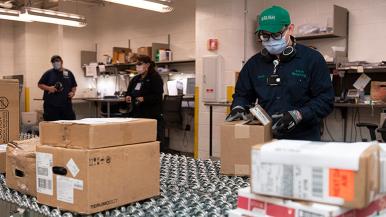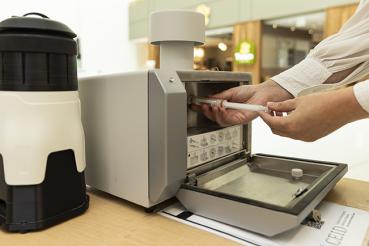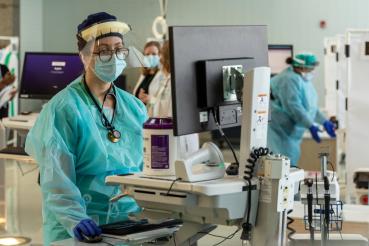You’ve already heard that many toys and gadgets will be hard to find this holiday season because of supply chain issues. But it’s not just retail stores dealing with product shortages. Hospitals, too, are running low on everyday items like syringes and even advanced cancer drugs.
Fortunately, the supply chain and pharmacy teams at Rush University Medical Center are prepared for what’s ahead and have systems in place to ensure patients can get the treatment they need, when they need it.
‘Every day there’s a new one that we have to deal with’
“On a national level, hospitals are facing shortages of everything from medical supplies to capital equipment to construction supplies,” says Jeremy Strong, vice president of supply chain and hospital operations at Rush, which was recently named one of the Top 25 Healthcare Supply Chains for 2021 by Gartner, Inc.
Strong blames raw material shortages, factory shutdowns and production issues due to labor issues and COVID outbreaks, as well as transportation labor issues and border restrictions related to the pandemic. At the same time supplies are running low, demand is rising as hospitals are performing more procedures.
For months, many commodity products used in health care have been back-ordered, and supply chain leaders at Rush have been working with clinicians to find acceptable substitutes. The shortages are particularly acute for products made of plastic, such as exam and surgical gloves, tubing used for intravenous lines and basic laboratory supplies. “It feels like every day there’s a new one that we have to deal with,” Strong says.
The global microchip shortage is also reducing the availability of new medical devices and other technology for patient care.
Meanwhile, nearly 200 drugs are in short supply nationwide, according to the American Society of Health-System Pharmacists, the group representing hospital pharmacists. While drug shortages are nothing new, they have become worse during the pandemic. “In the pharmacy world, we’re very sensitive to any type of shortage, but COVID took it to a whole new level where you couldn’t just look at the shortage list once a week, you had to be looking at it daily, sometimes four or five times a day,” says Erin Shaughnessy, PharmD, Rush’s director of inpatient pharmacy.
Managing inventory to keep patients safe
To monitor its inventory of medical supplies, Rush uses a weighted-bin system with scales that can tell how much of a supply is in each stocking location in real time. This allows the supply chain team to shift products from one site to another to keep up with demand and get ahead of any future shortages. This system, coupled with creative sourcing strategies, has helped Rush keep its shelves stocked with personal protective equipment (PPE) even during the worst periods of the pandemic.
On the pharmacy side, Rush implemented a system that tracks real-time drug inventory levels, monitors usage patterns and alerts staff far in advance of potential drug shortages. When they sense a potential issue, Rush pharmacists proactively reach out to their distributors and wholesalers. That’s what they did a few months ago when two drugs used in most areas of the hospital, hydromorphone and morphine, went on shortage. “We were able to immediately react, talk to our distributor and say, okay, we need to talk about changing our allocation,” Shaughnessy says.
Currently, one drug in short supply across the country due to increased demand is intravenous tocilizumab, sold under the brand name Actemra. This immunotherapy drug is used to treat a variety of conditions including cancer, rheumatoid arthritis and COVID-19. Unlike some hospitals that have had to reserve the drug for non-COVID patients, Rush was able to source a version of the drug delivered by subcutaneous injection, so COVID-19 patients will have it if they need it. “We never want to have a situation where we don’t have what we need for a patient,” she says.
Sharing supplies with community partners
Because of its effective supply chain and pharmacy management systems and procedures, Rush has been able to help other local hospitals in need. When Pfizer-BioNTech’s COVID vaccine was first approved, many hospitals were scrambling for a certain type of syringe used to extract an extra dose from each vaccine vial. Because Rush had stocked up ahead of time, it provided these syringes to the John H. Stroger, Jr. Hospital of Cook County and other organizations.
Looking ahead, Strong expects medical supply shortages will persist for the next six to 12 months. Until global supply chain issues ease up, his team will continue to work with clinicians to find acceptable alternatives and meet with manufacturers to anticipate and address potential supply chain problems. “The more we can do that ahead of time, the less impact it has on the clinical operations and the more easily we can get through those shortage periods,” he says.




